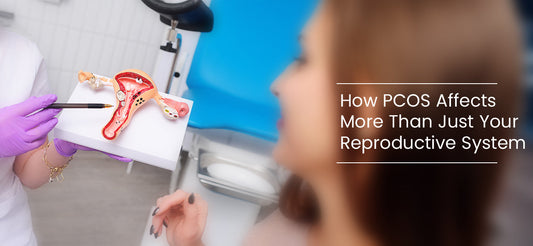Introduction
Women play multiple roles, from caregivers and professionals to partners and friends. With such a demanding lifestyle, women must prioritize their health and well-being. While a balanced diet should provide essential nutrients, meeting all the requirements can be challenging. This is where multivitamins step in as a convenient and effective solution.
In this blog, we will explore the benefits of multivitamins for women's health and how they can support overall well-being. [1]
Bridging Nutritional Gaps
Maintaining optimal nutrition is essential for women's health, as it impacts various bodily functions. Unfortunately, our modern lifestyles often make it challenging to obtain all the necessary nutrients solely through diet. Multivitamins act as a safety net by providing a wide range of vitamins and minerals that may be lacking in our daily meals. These supplements fill the nutritional gaps and support overall health. [1,2]
Boosting Energy Levels
Many women juggle numerous responsibilities, leading to fatigue and low energy levels. Multivitamins, enriched with B vitamins, can help combat fatigue by converting food into energy. Thiamine (B1), riboflavin (B2), niacin (B3), and pantothenic acid (B5) are critical nutrients in promoting energy production. By replenishing these vitamins, multivitamins can boost natural energy, helping women stay active and focused throughout the day. [3]
Supporting Bone Health
Maintaining strong and healthy bones is essential for women, especially as they age. Calcium and vitamin D are vital nutrients that contribute to bone health. While calcium is known for its role in bone strength, vitamin D aids in calcium absorption. Multivitamins formulated for women often contain adequate nutrients, reducing the risk of osteoporosis and promoting optimal bone health. [4]
Enhancing Immune Function
A robust immune system is crucial for protecting against infections and illnesses. Multivitamins play a significant role in strengthening the immune system, thanks to the inclusion of vitamins C, D, and E and minerals like zinc and selenium. These nutrients help support the production of immune cells and enhance their function. Multivitamins can help women stay healthier and recover faster from illnesses by bolstering the body's defense mechanisms. [5,6]
Promoting Heart Health
Heart disease is a leading cause of death among women. Taking proactive steps to maintain heart health is crucial, and multivitamins can be part of the strategy. Specific vitamins and minerals found in multivitamins, such as vitamins B6, B12, folic acid, and magnesium, play a role in reducing the risk of cardiovascular disease. They help regulate blood pressure, lower cholesterol levels, and support proper heart function. Incorporating multivitamins into a heart-healthy lifestyle can contribute to a healthier cardiovascular system. [7,8]
Supporting Mental Well-being
Women often face unique mental health challenges, including stress, anxiety, and depression. Multivitamins containing B vitamins, particularly vitamin B12 and folate, support brain health and promote emotional well-being. These vitamins aid in producing neurotransmitters, such as serotonin and dopamine, crucial in regulating mood and reducing the risk of mental health disorders. [9]
Conclusion
Multivitamins offer a convenient and reliable way for women to bridge nutritional gaps and support their overall health. These supplements provide a wide range of benefits, from boosting energy levels to promoting heart health and enhancing mental well-being. While multivitamins should not replace a balanced diet, they can be valuable to a healthy lifestyle. It is always recommended to consult with a healthcare professional to determine the specific needs and appropriate dosages based on individual circumstances. With multivitamins, women can take proactive steps toward optimizing their health and well-being. [10]
References
- Feskens, E.J.M., Bailey, R., Bhutta, Z. et al.Women’s health: optimal nutrition throughout the lifecycle. Eur J Nutr 61 (Suppl 1), 1–23 (2022). https://doi.org/10.1007/s00394-022-02915-x
- Seibel MM. The role of nutrition and nutritional supplements in women's health. Fertil Steril. 1999 Oct;72(4):579-91. doi: 10.1016/s0015-0282(99)00303-9. PMID: 10521091.
- Mikkelsen, K., Apostolopoulos, V. (2019). Vitamin B1, B2, B3, B5, and B6 and the Immune System. In: Mahmoudi, M., Rezaei, N. (eds) Nutrition and Immunity. Springer, Cham. https://doi.org/10.1007/978-3-030-16073-9_7
- Price CT, Langford JR, Liporace FA. Essential Nutrients for Bone Health and a Review of their Availability in the Average North American Diet. Open Orthop J. 2012;6:143-9. doi: 10.2174/1874325001206010143. Epub 2012 Apr 5. PMID: 22523525; PMCID: PMC3330619.
- Shakoor H, Feehan J, Al Dhaheri AS, Ali HI, Platat C, Ismail LC, Apostolopoulos V, Stojanovska L. Immune-boosting role of vitamins D, C, E, zinc, selenium and omega-3 fatty acids: Could they help against COVID-19? Maturitas. 2021 Jan;143:1-9. doi: 10.1016/j.maturitas.2020.08.003
- Alpert, Patricia. (2017). The Role of Vitamins and Minerals on the Immune System. Home Health Care Management & Practice. 29. 108482231771330. 10.1177/1084822317713300.
- Bruins MJ, Van Dael P, Eggersdorfer M. The Role of Nutrients in Reducing the Risk for Noncommunicable Diseases during Aging. Nutrients. 2019; 11(1):85. https://doi.org/10.3390/nu11010085
- DiNicolantonio JJ, Liu J, O'Keefe JH. Magnesium for the prevention and treatment of cardiovascular disease. Open Heart. 2018 Jul 1;5(2):e000775. doi: 10.1136/openhrt-2018-000775.
- Ashok Kumar Dudi. Mental Health Therapy: Multivitamins. Int J Psychiatr Res. 2023; 6(3): 1-6.
- Bruins MJ, Bird JK, Aebischer CP, Eggersdorfer M. Considerations for Secondary Prevention of Nutritional Deficiencies in High-Risk Groups in High-Income Countries. Nutrients. 2018 Jan 5;10(1):47. doi: 10.3390/nu10010047. PMID: 29304025; PMCID: PMC5793275.







